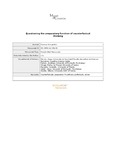Questioning the preparatory function of counterfactual thinking
| dc.contributor.author | Mercier, H | |
| dc.contributor.author | Rolison, JJ | |
| dc.contributor.author | Stragà, M | |
| dc.contributor.author | Ferrante, D | |
| dc.contributor.author | Walsh, Clare | |
| dc.contributor.author | Girotto, V | |
| dc.date.accessioned | 2018-10-15T08:50:01Z | |
| dc.date.available | 2018-10-15T08:50:01Z | |
| dc.date.issued | 2017-02 | |
| dc.identifier.issn | 0090-502X | |
| dc.identifier.issn | 1532-5946 | |
| dc.identifier.uri | http://hdl.handle.net/10026.1/12526 | |
| dc.description.abstract |
Why do individuals mentally modify reality (e.g., "If it hadn't rained, we would have won the game")? According to the dominant view, counterfactuals primarily serve to prepare future performance. In fact, individuals who have just failed a task tend to modify the uncontrollable features of their attempt (e.g., "If the rules of the game were different, I would have won it"), generating counterfactuals that are unlikely to play any preparatory role. By contrast, they generate prefactuals that focus on the controllable features of their ensuing behavior (e.g., "If I concentrate more, I will win the next game"). Here, we test whether this tendency is robust and general. Studies 1a and 1b replicate this tendency and show that it occurs regardless of whether individuals think about their failures or their successes. Study 2 shows that individuals generate relatively few controllable counterfactuals, unless explicitly prompted to do so. These results raise some questions regarding the generality of the dominant view according to which counterfactuals mainly serve a preparatory function. | |
| dc.format.extent | 261-269 | |
| dc.format.medium | ||
| dc.language | en | |
| dc.language.iso | en | |
| dc.publisher | Springer Verlag | |
| dc.subject | Counterfactuals | |
| dc.subject | Preparatory hypothesis | |
| dc.subject | Prefactuals | |
| dc.subject | Advice | |
| dc.title | Questioning the preparatory function of counterfactual thinking | |
| dc.type | journal-article | |
| dc.type | Journal Article | |
| dc.type | Research Support, Non-U.S. Gov't | |
| plymouth.author-url | https://www.webofscience.com/api/gateway?GWVersion=2&SrcApp=PARTNER_APP&SrcAuth=LinksAMR&KeyUT=WOS:000396911900007&DestLinkType=FullRecord&DestApp=ALL_WOS&UsrCustomerID=11bb513d99f797142bcfeffcc58ea008 | |
| plymouth.issue | 2 | |
| plymouth.volume | 45 | |
| plymouth.publication-status | Published | |
| plymouth.journal | Memory and Cognition | |
| dc.identifier.doi | 10.3758/s13421-016-0660-5 | |
| plymouth.organisational-group | /Plymouth | |
| plymouth.organisational-group | /Plymouth/Faculty of Health | |
| plymouth.organisational-group | /Plymouth/Faculty of Health/School of Psychology | |
| plymouth.organisational-group | /Plymouth/REF 2021 Researchers by UoA | |
| plymouth.organisational-group | /Plymouth/REF 2021 Researchers by UoA/UoA04 Psychology, Psychiatry and Neuroscience | |
| plymouth.organisational-group | /Plymouth/Research Groups | |
| plymouth.organisational-group | /Plymouth/Research Groups/Centre for Brain, Cognition and Behaviour (CBCB) | |
| plymouth.organisational-group | /Plymouth/Research Groups/Centre for Brain, Cognition and Behaviour (CBCB)/Cognition | |
| plymouth.organisational-group | /Plymouth/Users by role | |
| plymouth.organisational-group | /Plymouth/Users by role/Academics | |
| dc.publisher.place | United States | |
| dcterms.dateAccepted | 2016-10-15 | |
| dc.identifier.eissn | 1532-5946 | |
| dc.rights.embargoperiod | Not known | |
| rioxxterms.versionofrecord | 10.3758/s13421-016-0660-5 | |
| rioxxterms.licenseref.uri | http://www.rioxx.net/licenses/all-rights-reserved | |
| rioxxterms.licenseref.startdate | 2017-02 | |
| rioxxterms.type | Journal Article/Review |


